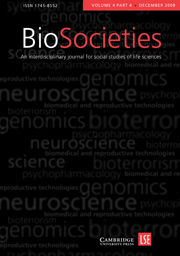No CrossRef data available.
Article contents
The Implications of Memory Research and ‘Memory Erasers’: A Conversation with Yadin Dudai
Published online by Cambridge University Press: 01 March 2009
Abstract
In this conversation, the world-renowned neurobiologist Yadin Dudai discusses the latest advances in memory research, specifically the discovery of memory ‘erasure’ associated with the inhibition of an enzyme called PKMzeta. The conversation tackles the reductionist method in scientific inquiry, the mind/brain dilemma, the problematics of animal models in memory research, and the therapeutic implications of this groundbreaking discovery.
Keywords
- Type
- Interview
- Information
- Copyright
- Copyright © London School of Economics and Political Science 2009
References
American Journal of Bioethics. (2007). 7(9).Google Scholar
Changeux, J.-P., & Ricœur, P. (2000). What makes us think? A neuroscientist and a philosopher argue about ethics, human nature, and the brain. (Eng. trans. of, Ce qui nons fait penser: la nature of la règle.) Princeton, NJ: Princeton UP.CrossRefGoogle Scholar
Dudai, Y. (2002). Memory from A to Z: Keywords, concepts, and beyond. Oxford: Oxford UP.CrossRefGoogle Scholar
Dudai, Y. (2004). The neurosciences: The danger that we will think that we have understood it all. In Rees, D. and Rose, S. (Eds), The New Brain Sciences: Perils and prospects, 167–180. Cambridge: Cambridge UP.Google Scholar
Illes, J. (2007). Not forgetting forgetting. American Journal of Bioethics, 7(9), 1–2.Google ScholarPubMed
Insel, T.R. (2007). From animal models to model animals. Biological Psychiatry, 62, 1337–1339.CrossRefGoogle ScholarPubMed
Ling, D.S., Benardo, L.S., Serrano, P.A., Blace, N., Kelly, M.T., Crary, J.F.et al. (2002). Protein kinase Mzeta is necessary and sufficient for LTP maintenance. Nature Neuroscience, 5, 295–296.CrossRefGoogle ScholarPubMed
Nagel, T. (1974). What is it like to be a bat? Philosophical Review, 83, 435–450.CrossRefGoogle Scholar
NIMH (National Institute of Mental Health) (2007). Memory-sustaining enzyme may help treat PTSD. NIMH Science News, URL (accessed November 2007): http://www.nimh.nih.gov/science-news/2007/memory-sustaining-enzyme-may-help-treat-ptsd-cognitive-decline.shtmlGoogle Scholar
Pastalkova, E., Serrano, P., Pinkhasove, D., Wallace, E., Fenton, A.A., & Sacktor, T.C. (2006). Storage of spatial information by the maintenance mechanism of LTP. Science, 313, 1141–1144.CrossRefGoogle ScholarPubMed
Shema, R., Sacktor, T.C., & Dudai, Y. (2007). Rapid erasure of long-term memory associations in the cortex by an inhibitor of PKM zeta. Science, 317(5840), 951–953.CrossRefGoogle ScholarPubMed


